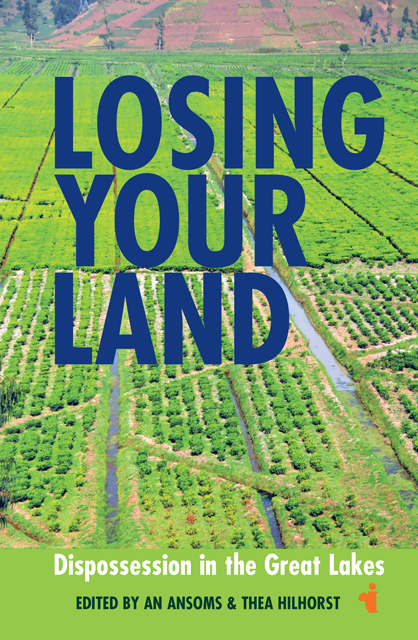Book contents
- Frontmatter
- Contents
- List of Illustrations
- Notes on Contributors
- Acknowledgements
- List of Abbreviations & Acronyms
- 1 Introduction: Causes & Risks of Dispossession & Land Grabbing in the Great Lakes Region
- 2 Land Grabbing & Development History: The Congolese Experience
- 3 This Land is My Land: Land Grabbing in Ituri (DRC)
- 4 Land Grabbing by Mining Companies: Local Contentions & State Reconfiguration in South Kivu (DRC)
- 5 Competition over Soil & Subsoil: Land Grabbing by Local Elites in South Kivu (DRC)
- 6 The Continuities in Contested Land Acquisitions in Uganda
- 7 Land Grabbing & Power Relations in Burundi: Practical Norms & Real Governance
- 8 Land Grabbing & Land Tenure Security in Post-Genocide Rwanda
- 9 The Reorganization of Rural Space in Rwanda: Habitat Concentration, Land Consolidation & Collective Marshland Cultivation
- 10 ‘Modernizing Kigali’: The Struggle for Space in the Rwandan Urban Context
- Conclusion
- Index
7 - Land Grabbing & Power Relations in Burundi: Practical Norms & Real Governance
Published online by Cambridge University Press: 24 February 2023
- Frontmatter
- Contents
- List of Illustrations
- Notes on Contributors
- Acknowledgements
- List of Abbreviations & Acronyms
- 1 Introduction: Causes & Risks of Dispossession & Land Grabbing in the Great Lakes Region
- 2 Land Grabbing & Development History: The Congolese Experience
- 3 This Land is My Land: Land Grabbing in Ituri (DRC)
- 4 Land Grabbing by Mining Companies: Local Contentions & State Reconfiguration in South Kivu (DRC)
- 5 Competition over Soil & Subsoil: Land Grabbing by Local Elites in South Kivu (DRC)
- 6 The Continuities in Contested Land Acquisitions in Uganda
- 7 Land Grabbing & Power Relations in Burundi: Practical Norms & Real Governance
- 8 Land Grabbing & Land Tenure Security in Post-Genocide Rwanda
- 9 The Reorganization of Rural Space in Rwanda: Habitat Concentration, Land Consolidation & Collective Marshland Cultivation
- 10 ‘Modernizing Kigali’: The Struggle for Space in the Rwandan Urban Context
- Conclusion
- Index
Summary
Introduction: land grabbing and ‘real governance’ in Burundi
Since the 1960s, Burundi has known several cycles of conflict – partly motivated by ethnic cleavages – with particularly violent escalations in 1968, 1972, 1973, 1988 and 1993 (Buyoya, 2011). These events lay at the base of massive refugee fluxes, with farmers leaving their place of origin and (temporarily) settling in neighbouring countries or elsewhere in Burundi, while leaving behind their land. Particularly following the 1972 flux, a large number of such properties were confiscated by the State or by individuals (see ibid.). Indeed, after the departure of these refugees, the reaction of local administrative authorities, from chefs de collines up to provincial governors, was often to redistribute this land as if it was vacant.
While most 1993 refugees and internally displaced persons (IDPs) could still recover their properties and reinstall themselves upon return to Burundi after 2000, this was not the case for the 1972 refugees (CNTB – Commission nationale des terres et autres biens, 2010: 1-3; for statistics, see UNHCR – United Nations High Commission for Refugees, 2009). After having spent more than thirty years in exile before their return, they were often confronted with fierce contestation over their old properties by those who now occupied them. The southern provinces were most affected by this problem, namely Bururi, Makamba and Rutana. The various governments that had ruled the country since the end of the civil war in 2000, made attempts to offer some solutions to this situation by setting up specialized commissions responsible for dealing with land conflicts related to the reinstallment of returnees and IDPs on their land (Manirumva, 2005). The most recent ‘Commission nationale des terres et autres biens’ (CNTB) has taken up its responsibilities since 2006.
However, conflicts over land in Burundi do not only concern (ex-) refugees or internally displaced population groups. Since independence, local Burundian officials have grabbed land. Elites often used their official positions to enforce their grip on particular landholdings. Moreover, these forms of land acquisition were often legitimized through the formal regulatory framework, defined by those in power at that particular moment in time. Land grabbing by local elites did not stop at the end of the civil war in 2000, even after the CNTB was established. A variety of political elites have grabbed vast tracks of land ever since (RCN – Réseau citoyens/Citizens Network ‘Justice et Démocratie’, 2004).
- Type
- Chapter
- Information
- Losing your LandDispossession in the Great Lakes, pp. 125 - 140Publisher: Boydell & BrewerPrint publication year: 2014



